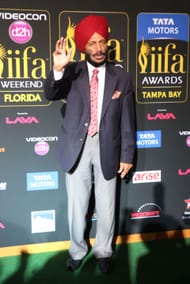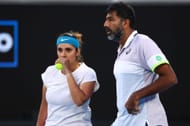The legendary Milkha Singh once famously said, “That pain will live in my heart till my last breath,” referring to the fourth-place finish in men’s 400m at the Rome Olympics back in 1960. India’s tryst with a fourth-place finish in the Olympics continued in Paris after marksman Arjun Babuta agonizingly found himself out of medal contention in a closely-contested men’s 10m Air Rifle final.
The Chandigarh-based shooter got himself into medal position for most parts of the final before his last shot of 9.5 made the difference. Arjun, who needed a 10.4 to be in the medal count, crashed out with a total of 208.4 just before the final medal positions were decided. The gold went to China’s Lihao Sheng while the silver and bronze were taken by Sweden’s Victor Lindgren and Croatia’s Miran Maricic, respectively.
The 25-year-old marksman’s narrow miss in Paris has added another chapter to India’s history with fourth-place finishes at the Olympic Games, dating back to 1952. Here’s a look at some of the instances when Indian athletes came close yet finished so far at the Olympics:
Keshav Mangave (1952 Helsinki)
Freestyle wrestler Keshav Mangave faced a heartbreak in the 1952 Helsinki Games when he lost to Josiah Henson of the USA in Round 5 of the men's freestyle 62kg (featherweight) category. A win would have put him in the top three that competed for the medals.
Indian football team (1956 Melbourne)
Considered India’s greatest-ever achievement in football, the Samar Banerjee-led Indian team experienced a heartbreak after going down to Bulgaria 0-3 in the bronze medal classification match. Earlier, India enjoyed a glorious run at the Games, with Neville D’Souza’s hat-trick helping the side floor Australia 4-2 en route to the semi-finals, where they went down to Yugoslavia 1-4.
Milkha Singh (1960 Rome)
The legendary Milkha Singh, popularly known as the ‘Flying Sikh’, fell short by the barest of margins (0.1 seconds) in the men’s 400m event. After comfortably passing the heats, he improved his timing by over a second in the quarter-finals and finished behind USA’s Otis Davis in the semis with a time of 45.9 seconds, securing a spot in the final as the fourth-fastest qualifier.
Despite a strong start initially in the final, he slowed down before the final turn, allowing South Africa’s Malcolm Spence to close in and eventually clinch the bronze clocking 45.5 seconds while Milkha lived with the pain of being 0.1 second behind till his passing away in May 2021.

PT Usha (1984, Los Angeles)
The current Indian Olympic Association president PT Usha is in Paris currently, and could probably be the best one to console Arjun. After all the ‘Payyoli Express’, as she is popularly called, endured a similar fourth-place finish in the 400m hurdles and missed a bronze by 1/100th of a second, a fraction that remains one of the narrowest misses in Olympic history.
Usha, who was India’s brightest medal prospect in the 1984 Olympics, scripted history by becoming the first Indian athlete to win an Olympic semifinal, defeating US champion Judi Brown by clocking 55.54 seconds in 400m hurdles. In the final, Usha ran an impressive race, clocking 55.42 seconds before narrowly missing the bronze after finishing just behind Romania's Cristina Cojocaru.
Leander Paes and Mahesh Bhupathi (2004, Athens)
The legendary doubles pair of Leander Paes and Mahesh Bhupathi finished fourth after going down to Croatia's Mario Ancic and Ivan Ljubicic 7-6 (5), 4-6, 16-14 in a grueling contest that lasted nearly four hours. Earlier, the fifth-seeded Indian pair, who entered the semifinals as favorites, were defeated in straight sets 2-6, 3-6 by the German team of Rainer Schuttler and Nicholas Kiefer.
Joydeep Karmakar (London 2012)
One of India’s decorated shooters, Joydeep Karmakar set an Olympic record during the qualification round in London. Despite that, he went on to experience the heartbreak of missing out on a podium finish after eventually finishing fourth in the 50m Rifle Prone event. Karmakar finished with a score of 699.1, just 1.9 shy of the bronze medal winner's 701.0.
Dipa Karmakar, Abhinav Bindra; Sania Mirza-Rohan Bopanna (2016, Rio de Janeiro)

Tripura’s Dipa Karmakar, who rose to prominence by becoming the first Indian female gymnast to compete at the Olympics, finished fourth in the women's vault final, just 0.150 points away from a historic bronze medal. At the Rio vault finals, where Simone Biles was expected to dominate, word spread that the 22-year-old from India would attempt a Produnova, also known as the “vault of death”—a triple flip to the mat.
Even Simone Biles wouldn't attempt this. Dipa began with a Tsukahara 720, scoring 14.866 points, keeping her in medal contention. Her second vault, the Produnova, earned her 15.266 points. For a few moments, Karmakar was in the second spot, until Biles and Russia’s Maria Paseka completed their routines. In the end, she finished fourth, just 0.150 points behind Giulia Steingruber of Switzerland.
Beijing Olympics gold medallist shooter Abhinav Bindra also suffered a similar fourth-place finish during the Rio 2016 games. The rifle marksman ended fourth on the leaderboard after a shootoff where he shot 10 and rival Serhiy Kulish of Ukraine shot 10.5.
The fourth-seeded Indian tennis pair of Sania Mirza and Rohan Bopanna missed out on a bronze after losing to Radek Stepanek and Lucie Hradecka 6-1, 7-5 in the semi-finals of the mixed doubles at Rio 2016.
Indian women’s hockey team (1980 Moscow, 2020 Tokyo)
The Indian women’s hockey team endured a similar heartbreak at the 1980 Moscow Games and Tokyo 2020 after narrowly missing out on a bronze. After losing 0-1 to Argentina in the semifinal, the Rani Rampal-led side were in the running for a bronze with a handy 3-2 lead against Great Britain before their hopes were dashed when the opponents scored twice to go ahead 4-3 to clinch the bronze.
Aditi Ashok (2020, Tokyo)
Golfer Aditi Ashok made Indians fall in love with her niche sport after finishing fourth in the Tokyo Games. Competing with the top golfers from across the world, Aditi put up a stunning performance in the women’s Golf Individual Strokeplay only to finish just outside the bronze medal position after 72 holes.
